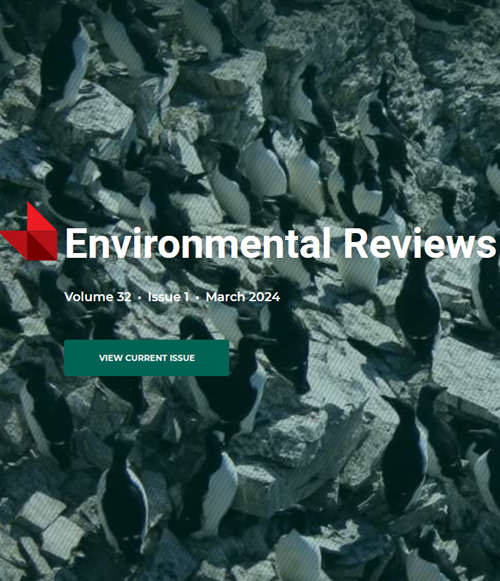“自然”灾害对水生生物和栖息地的影响
IF 5.1
3区 环境科学与生态学
Q2 ENVIRONMENTAL SCIENCES
引用次数: 2
摘要
“自然”灾害(也称为地球物理灾害)涉及对人类产生直接或间接影响的物理过程。这些事件发生得很快,可能会对当地动植物产生严重后果,因为它们的栖息地发生了戏剧性的突然变化。尽管大多数研究都集中在自然灾害对人类和陆地系统的影响上,但地球物理灾害也会影响水生生态系统。在这里,我们综合介绍了最常见和最具破坏性的地球物理灾害对水生系统(生命和栖息地)的影响。我们的方法涵盖了各个领域(即淡水、河口、海洋)和分类群(即植物、脊椎动物、无脊椎动物、微生物),包括洪水、干旱、野火、飓风/旋风/台风、龙卷风、沙尘暴、冰风暴、雪崩(雪)、山体滑坡、火山爆发、地震(包括湖泊爆发)、海啸和宇宙事件。许多地球物理灾害对水生系统产生了巨大影响。一些自然灾害的证据基础有些有限,因为瞬态事件(如龙卷风、洪水)很难研究。大多数自然灾害研究侧重于地质/地貌以及对人类和基础设施的危害评估。然而,水生系统的破坏可以通过粮食安全、文化服务或生计的损失间接影响人类。许多地球物理灾害以复杂的方式相互作用(例如,野火经常导致山体滑坡和洪水),并可能被人类活动放大或以其他方式介导。我们的综合研究表明,地球物理事件通常以负面的方式影响水生生态系统,但只要不因人为压力而加剧影响,系统就可以具有弹性。很难预测或预防地球物理灾害,但鉴于人类与水生生态系统之间的内在联系,了解水生生态系统如何受到地球物理事件的影响很重要。本文章由计算机程序翻译,如有差异,请以英文原文为准。
Consequences of “Natural” Disasters on Aquatic Life and Habitats
“Natural” disasters (also known as geophysical disasters) involve physical processes that have a direct or indirect impact on humans. These events occur rapidly and may have severe consequences for resident flora and fauna as their habitat undergoes dramatic and sudden change. Although most studies have focused on the impact of natural disasters on humans and terrestrial systems, geophysical disasters can also impact aquatic ecosystems. Here we provide a synthesis on the effects of the most common and destructive geophysical disasters on aquatic systems (life and habitat). Our approach spanned realms (i.e., freshwater, estuarine, marine) and taxa (i.e., plants, vertebrates, invertebrates, microbes) and included floods, droughts, wildfires, hurricanes/cyclones/typhoons, tornadoes, dust storms, ice storms, avalanches (snow), landslides, volcanic eruptions, earthquakes (including limnic eruptions), tsunamis, and cosmic events. Many geophysical disasters have dramatic effects on aquatic systems. The evidence base is somewhat limited for some natural disasters because transient events (e.g., tornadoes, floods) are difficult to study. Most natural disaster studies focus on geology/geomorphology and hazard assessment for humans and infrastructure. However, the destruction of aquatic systems can impact humans indirectly through loss of food security, cultural services or livelihoods. Many geophysical disasters interact in complex ways (e.g., wildfires often lead to landslides and flooding) and can be magnified or otherwise mediated by human activities. Our synthesis reveals that geophysical events influence aquatic ecosystems, often in negative ways, yet systems can be resilient provided that effects are not compounded by anthropogenic stressors. It is difficult to predict or prevent geophysical disasters but understanding how aquatic ecosystems are influenced by geophysical events is important given the inherent connection between peoples and aquatic ecosystems.
求助全文
通过发布文献求助,成功后即可免费获取论文全文。
去求助
来源期刊

Environmental Reviews
环境科学-环境科学
自引率
3.50%
发文量
45
期刊介绍:
Published since 1993, Environmental Reviews is a quarterly journal that presents authoritative literature reviews on a wide range of environmental science and associated environmental studies topics, with emphasis on the effects on and response of both natural and manmade ecosystems to anthropogenic stress. The authorship and scope are international, with critical literature reviews submitted and invited on such topics as sustainability, water supply management, climate change, harvesting impacts, acid rain, pesticide use, lake acidification, air and marine pollution, oil and gas development, biological control, food chain biomagnification, rehabilitation of polluted aquatic systems, erosion, forestry, bio-indicators of environmental stress, conservation of biodiversity, and many other environmental issues.
 求助内容:
求助内容: 应助结果提醒方式:
应助结果提醒方式:


